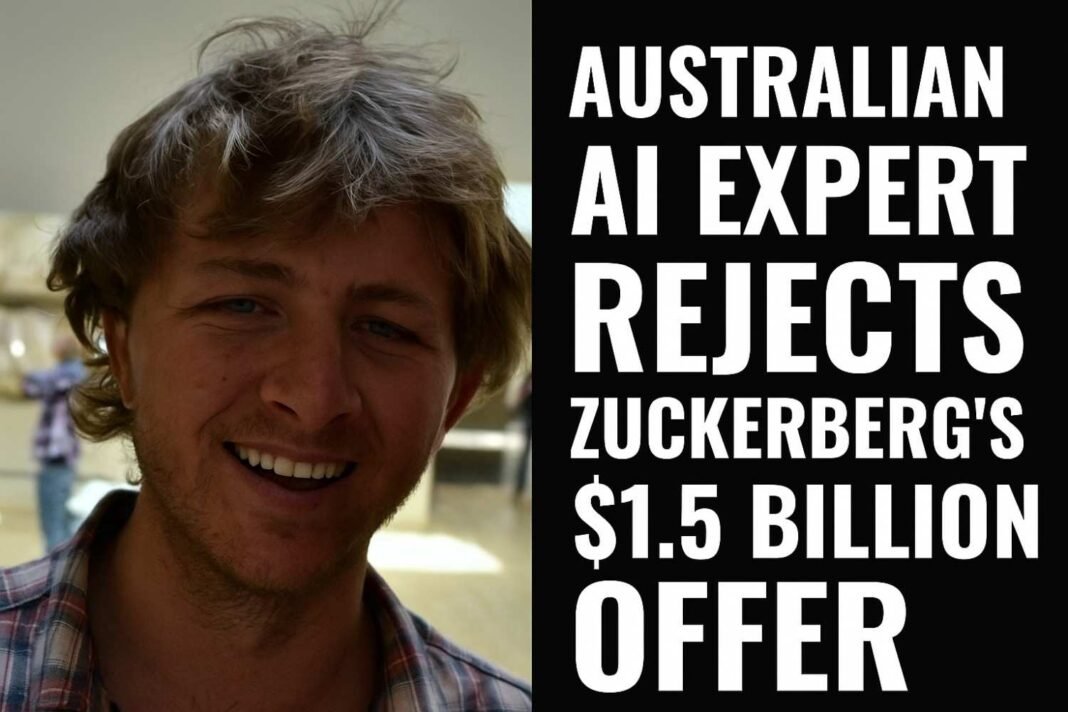Andrew Tulloch: The AI Visionary Who Said No to Meta
In the high-stakes world of artificial intelligence, where billion-dollar valuations and aggressive talent hunts are increasingly the norm, one man’s bold decision to walk away from a staggering offer has sparked global intrigue. Andrew Tulloch, an Australian computer scientist and machine learning expert, has gone viral for turning down a $1.5 billion job proposal from tech giant Meta, headed by Mark Zuckerberg.
Tulloch’s career, which spans from Wall Street to Silicon Valley, exemplifies a dream trajectory in the tech world. But it is his latest move – or rather, his refusal to move – that has earned him the spotlight. Despite Meta’s aggressive attempts to poach talent for its new AI superintelligence unit, Tulloch chose to stay the course with Thinking Machines Lab, a startup he co-founded that’s already shaking up the AI ecosystem.
A Journey Through the World’s Top Institutions
Tulloch’s academic and professional background reads like a blueprint for AI leadership. He completed his undergraduate studies at the University of Sydney before heading to the University of Cambridge, where he earned a distinction in mathematical statistics from Trinity College.
Professionally, Tulloch began his career as a strategist with Goldman Sachs. However, it was in the tech sector that he found his true calling. He joined Facebook (now Meta) in 2012, working on core aspects of the advertising machine learning platform – including feature engineering, real-time serving systems, and inference platforms. This early experience would lay the foundation for his reputation as a leading AI engineer.
After a brief hiatus to pursue graduate studies, Tulloch returned to Meta for an extended 11-year stint, during which he became deeply involved in machine learning systems. In October 2023, Tulloch left Meta for OpenAI, the organization behind ChatGPT and a major force in AI innovation. But just over a year later, he made another leap – this time to Thinking Machines Lab.
The Birth of Thinking Machines Lab
Co-founded by Tulloch and Mira Murati – who previously served as OpenAI’s Chief Technology Officer – Thinking Machines Lab is an ambitious AI startup aiming to push the frontiers of artificial intelligence beyond chatbots. Despite not having launched a commercial product yet, the company has already achieved a jaw-dropping $12 billion valuation in its seed round. This, combined with its roster of elite talent, has made it a prime target for headhunters.
Meta, reportedly leading an intense recruitment campaign to build its own AI superintelligence unit, set its sights on Thinking Machines Lab. According to a Wall Street Journal report, Zuckerberg’s team offered Tulloch a deal potentially worth $1.5 billion over six years – a figure contingent on bonuses and stock performance.
Why Tulloch Said No
While such astronomical offers would be difficult for most to refuse, Tulloch stood firm. Sources familiar with the offer noted its complexity – a large portion was tied to Meta’s stock performance. Still, the total figure was enough to make headlines.
Meta’s spokesperson, Andy Stone, downplayed the claim, calling the reported offer “inaccurate and ridiculous,” and reiterated that compensation depends on the company’s stock valuation. Yet, the buzz surrounding Tulloch’s decision has only intensified. His refusal has been widely interpreted as a strong vote of confidence in Thinking Machines Lab’s mission – and a subtle rebuke of Silicon Valley’s growing obsession with stock-driven poaching.
Social Media Applauds the Move
As the news spread, Tulloch’s LinkedIn profile began circulating across social platforms. The viral screenshot of his career progression – Goldman Sachs to Meta to OpenAI to Thinking Machines Lab – has inspired both admiration and debate. Many see it as a rare example of someone in the tech world choosing vision over valuation.
Here he is: the man who turned down a $1B offer over 4yrs from Meta. pic.twitter.com/fLqVxZFWFz
— Deedy (@deedydas) August 2, 2025
Tulloch’s personal website reinforces this narrative. In his own words, he describes his early work at Facebook and his passion for developing machine learning infrastructure. While he remains largely silent on the Meta offer, the message is clear: he believes in building something transformative rather than being swayed by financial temptations.
In a world where billion-dollar deals often overshadow principle, Andrew Tulloch’s decision offers a different kind of inspiration – one rooted in conviction, vision, and the courage to say no.







